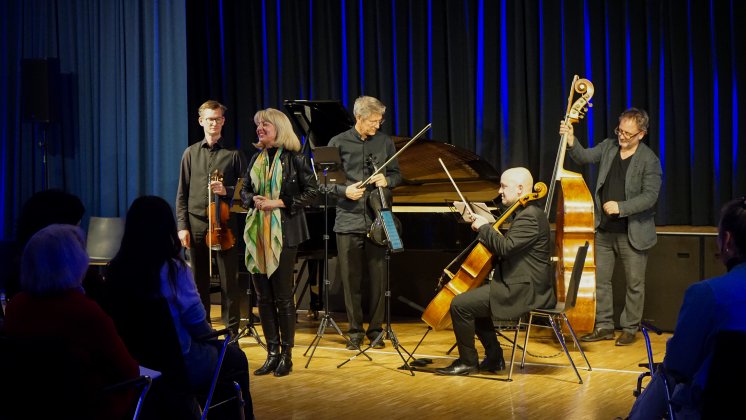The program includes Bach's "Goldberg Variations" and their modern continuation as a jazz number. And what happens when a whole hall full of computer science and management students from the TUM Heilbronn campus are confronted with a highly complex work that is almost 300 years old? They are absolutely thrilled. Because – as the event shows once again – the students at TUM Campus Heilbronn are not technical nerds or ice-cold careerists. They are young, open-minded people with a wide range of interests. And they are also enthusiastic about the fine arts.
How innovation arises from mistakes
There is something else special about this evening, as presenter Kornelia Kneissl says: "We are bringing music and learning together." The concert is followed by a lively discussion about what can be learned from music for the world of work. And that is a lot. Firstly, the topic of error culture, on which Johannes Hehrmann poses a rhetorical question: "Isn't a mistake just an unexpected change?" "We musicians are lucky: if we make a mistake, nobody gets hurt," says Mini Schulz. Information Engineering student Fathia Ismail, herself a pianist for many years, puts it particularly well: "Even if you make mistakes, try to make them beautiful, as if you are adding another chapter to the story."
The other important theme of the evening is leadership: the ensemble plays without a conductor. Violinist Hehrmann counters a possible misunderstanding: "It's an illusion that we play without leadership." On the contrary: depending on the music, sometimes one or the other takes on the leadership role – situational leadership is the order of the day. "This is an example of an ecosystem that works without a leader," Daniel Gottschald, Managing Director of Die TUM Campus Heilbronn gGmbh, puts it in a nutshell. The secret of success? The musicians listen to each other. "We have to understand each other through the music we play," says student Ismail.
Music brings people together
It is not far from listening to understanding. And so the third important insight of the evening is: music unites people. "It brings people from different backgrounds together," says presenter Kneissl. Violinist Hehrmann also leaves no doubt about this: "No matter where we play – we always have a close connection." Daniel Gottschald is convinced that art and culture can make an enormous contribution to personal development: "The educational role of art, of music is so strong." In addition to many valuable insights, the evening may soon produce a concrete result: in response to many requests, Daniel Gottschald promised to seriously consider the purchase of a piano for the TUM Campus Heilbronn.



